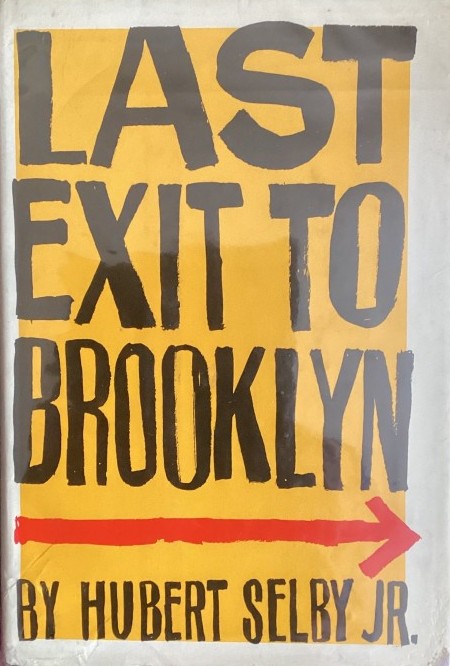Inspiring Older Readers
 posted on 20 Sep 2023
posted on 20 Sep 2023
Last Exit to Brooklyn by Hubert Selby Jr.
Some books take us into the world of alternative, transgressive communities and reveal a reality that inevitably involves subjects that aren’t just uncomfortable but positively repellent. And then there are books that take us even deeper down and can be a physically as well as aesthetically challenging – they trade in subject matter that disgusts. Last Exit to Brooklyn is an example of the latter.
Originally published by the Grove Press in the USA in 1964, when it appeared in the UK in 1967, it immediately caused outrage and demands for it to be banned. It became the subject of a successful private prosecution for obscenity which was brought by Tory MP Sir Cyril Black in 1967. As had happened with the Lady Chatterley case, a host of literary big-hitters appeared in defence of the book – Frank Kermode, Anthony Burgess, Allen Ginsberg – and the decision to ban it was overturned on appeal.
The book is really six short stories that are linked by the sometimes tenuous subject of the outsider. Criminals, transexuals, rapists, prostitutes all people the pages in a way that, if it was possible with printed matter, would emit the unpleasant odour. It’s really hard to convey just what a hard reading experience it can be at times but I thought this 1964 review from The New York Times does an excellent job of expressing the contemporary social attitudes that existed towards the world of the outsider:
“The stories are all set in the slum‐wasteland of waterfront Brooklyn, with occasional subway trips to the seamier pick‐up bars off Times Square and the “gay” bars farther uptown. The characters — more animals or “things” really than people—are the ugly superfluous of the underworld: whores, toughs, transvestites, losers all, dispossessed by life, corrupted from birth, devoid of choice.
Love is the perversion for these people. Lust, for sex or blood (there is no distinction, except in the flickering fantasy of a pining queen), is only a mechanical necessity, without moral consequence.
They exist in violence—the outer violence of gratuitous cruelty and destruction, the inner violence of terror, hate and oppressive, senseless frustration. Their language is the language of the gutter, vocal ejaculations off degradation and despair, the obscene grunts and cries that in real life we turn away from, close our ears to, do not hear, cannot retain.”
The language and attitudes used in the 60s now seems harsh and judgemental in today's world and those who were once outsiders have found a place of more accommodation and respect. But in their historical circumstances, the people depicted in Last Exit were the literal bottom of the heap and were used to behaving in that way.
Selby’s focus isn’t just sexual transgression but the often disturbingly violent crime that tended to come along in its wake. The rape of a young prostitute in the story called Tralala is genuinely troubling and arguments have raged over whether the detail is gratuitous or a necessary part of the unpleasant truth of her situation. Inevitably, you have to ask whether Selby includes this terrible assualt as a piece of brutal realism or as gratutious thrill-seeking sensationalism. I tend to think that the jury is still out on that question.
Whilst it’s certainly true that this is a book that tests both your moral and ethical compass, Selby is also capable of moments of extraordinary lyricism and empathy for his subject. If you keep reading, it will be because this is a writer giving voice to a voiceless community who can inflict violence on each other because society inflicts violence on them.
The other thing that may test your reading patience is Selby’s decision to write the book in a style that reflects the street speech of Brooklyn. The punctuation and sentence structure may seem idiosyncratic but if you read the text out aloud (at least in your head to avoid irritating other people) you’ll see exactly what he was trying to achieve.
You’ll see from this review that I’m hugely conflicted about this novel – I suppose it’s possible to love and hate it at one and the same time. Anyway, the only way to find out what you think of it is to buy your own copy. Paperbacks are readily available and should cost you well under £10.
Terry Potter
September 2023